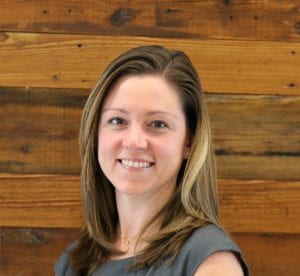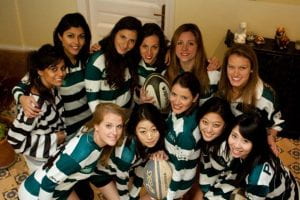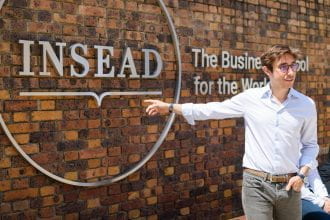By investing in climate-solutions businesses, Vivian Bertseka isn’t just generating returns or supporting the planet. She’s promoting a more sustainable form of capitalism.
 When the financial markets collapsed in 2008, Vivian Bertseka MBA’11J was one of the few investors left standing.
When the financial markets collapsed in 2008, Vivian Bertseka MBA’11J was one of the few investors left standing.
It helped that she was in the right place at the right time: Vivian was working for Apollo Management, a New York-based distressed investor that was uniquely equipped to capitalise on investment opportunities in a falling market. A member of a 14-person team, Vivian helped manage a $3.3 billion publicly traded fund and invested more than $300 million in 10 portfolio companies.
Yet that success didn’t blind Vivian from the lessons of the financial crash. The boom and bust of the market, she says, made her recognise the importance of governance, quality management and business ethics, as well as the reality that “success can be taken back really quickly.”
That wisdom belies her age (she’s 31), but perhaps accounts for Vivian’s remarkable career trajectory in a few short years. A 2005 graduate of Harvard University, she worked as an associate for UBS Securities before joining Apollo in 2007 and enrolling in INSEAD three years later. After earning her MBA with distinction, she was named a director at Generation Investment Management, a London-based investment management firm, founded by a team including Al Gore, former vice president of the United States, and David Blood, previous head of Goldman Sachs Asset Management.
Her work at Generation hasn’t gone unnoticed: This year, the Dow Jones & Company’s Financial News named Vivian to its list of “40 Under 40 Rising Stars in Private Equity.”
The goal of sustainable capitalism
At Generation, Vivian is part of a team managing the Climate Solutions Fund (one of three strategies at the boutique firm), investing and driving growth in climate-solutions businesses such as Seventh Generation, a U.S.-based producer and distributor of eco-friendly household products.
While the fund seeks out businesses that support a low-carbon, sustainable economy, its strategy does not seek to sacrifice returns for impact. “We use sustainability as a research tool to outperform the market,” she says. “We are long-term investors … and if you’re taking a 10-year view on an investment, you have to take sustainability into account.”
In practice, that means that Vivian and the larger team at Generation avoid businesses that, in essence, borrow from future generations or future circumstances to create near-term performance.
Broadly, the firm’s goal is to see sustainable, long-term investing become best practice and for sustainable capitalism to become the enduring economic model. Part of the profits generated by the firm go directly to the Generation Foundation, a nonprofit which focuses its advocacy work on the case for and awareness of sustainable capitalism — one that supports the health of people, profits and the planet.
A globally connected community
In a way, you can credit INSEAD for leading Vivian down a professional path that serves a global purpose.
Indeed, it was INSEAD’s exceptionally diverse community that drew Vivian to the school. After living in the United States for nine years, the Athens, Greece native was itching to return to Europe and immerse herself in a multicultural community. She also wanted to expand her global network, focusing specifically on the London market. “INSEAD, by far, has the biggest network in London,” she notes.
Upon enrolling in INSEAD, Vivian focused on making the most of every minute in the one-year programme. To broaden her global perspective, she studied on both the Fontainebleau and Singapore campuses; to balance out her core skills in finance, she also took classes in management and negotiations.
 Outside the classroom, Vivian found an opportunity to put those leadership skills to the test: She restarted INSEAD’s women’s rugby club and was named captain, responsible for recruiting and rallying members throughout the school year. “It was a big challenge,” she recalls, “because there’s a constant exchange of populations at INSEAD. You need to keep people engaged.”
Outside the classroom, Vivian found an opportunity to put those leadership skills to the test: She restarted INSEAD’s women’s rugby club and was named captain, responsible for recruiting and rallying members throughout the school year. “It was a big challenge,” she recalls, “because there’s a constant exchange of populations at INSEAD. You need to keep people engaged.”
Her efforts paid off, however; that year, the rugby club was the biggest women’s club at INSEAD. “It included women who had never played a ball sport in their lives,” Vivian recalls. “Everyone was out there, having fun together. I think the quality of bonds that we made were actually quite special.”
Off the rugby field, Vivian bonded with another member of the INSEAD community: Classmate Pieter Lemmer MBA’11D, a South African native. In 2013, they were married in Greece.
Diversity as a business imperative
Since graduating from INSEAD, Vivian and Pieter have taken several trips to Africa and Southeast Asia, which has given them “a different view of the world,” Vivian says. Seeing poverty up close, for instance, has given Vivian a heightened understanding for the types of global issues that Generation is trying to address.
Vivian also has an appreciation for one of Generation’s core beliefs: that diversity is a business imperative. The team at Generation represents more than 20 countries and speaks over 25 languages, and encourages collaboration among investors with diverse areas of expertise.
“Including diversity in your team is key to making good investment decisions,” she notes. “And it’s quantifiable. We believe that diversity eliminates errors in decision making.”
A passion that’s personal and professional
When it comes to core values, the lines between Vivian’s personal and professional life continue to blur — in a good way.
She’s troubled, she says, by the way climate change has not been adequately addressed. For her part, at Generation, she is using the power of economics to right those wrongs.
“I have a deep belief that efficient capital allocation serves a higher purpose in terms of long-term development,” she says. “We can invest in a way that’s economically viable and beneficial to society.”


